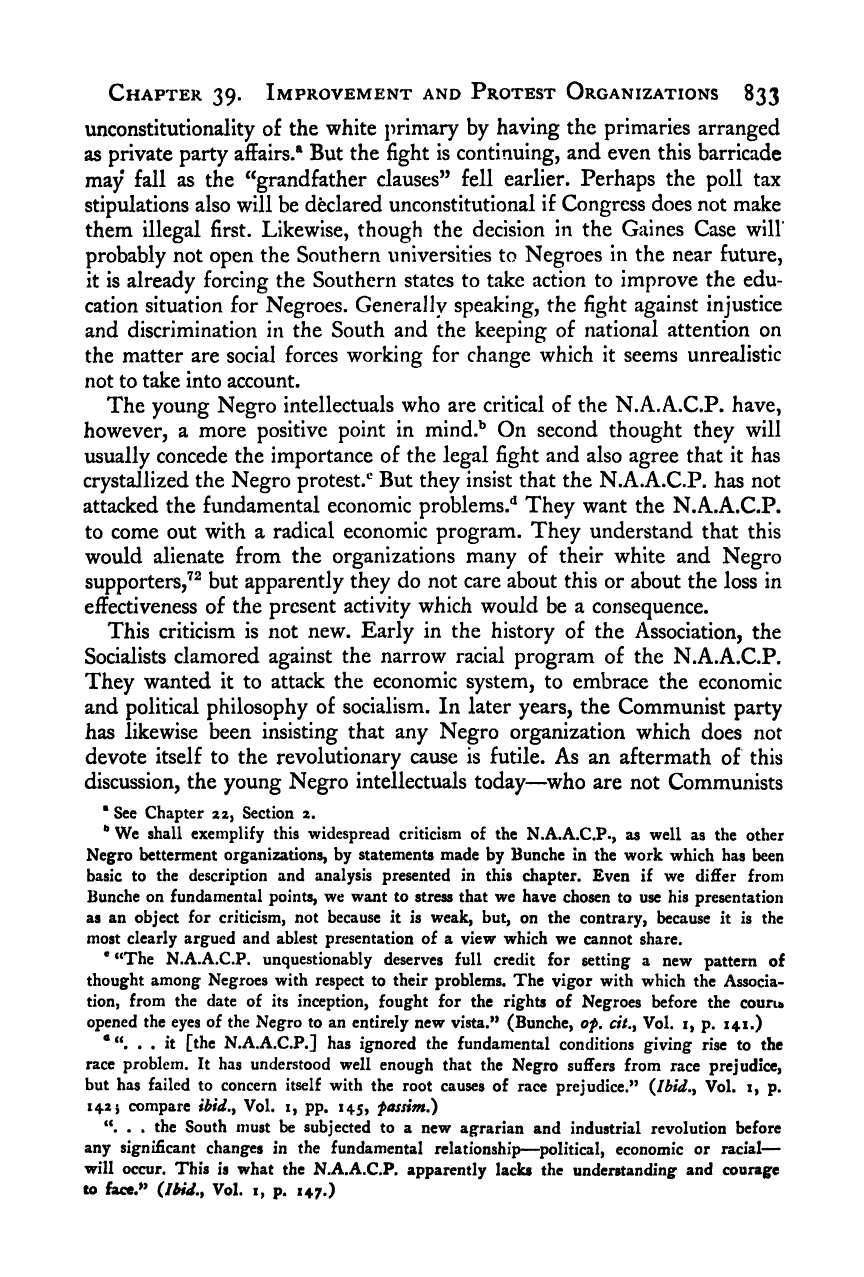Note: Gunnar Myrdal died in 1987, less than 70 years ago. Therefore, this work is protected by copyright, restricting your legal rights to reproduce it. However, you are welcome to view it on screen, as you do now. Read more about copyright.
Full resolution (TIFF) - On this page / på denna sida - IX. Leadership and Concerted Action - 39. Negro Improvement and Protest Organizations - 9. Critique of the N.A.A.C.P.

<< prev. page << föreg. sida << >> nästa sida >> next page >>
Below is the raw OCR text
from the above scanned image.
Do you see an error? Proofread the page now!
Här nedan syns maskintolkade texten från faksimilbilden ovan.
Ser du något fel? Korrekturläs sidan nu!
This page has never been proofread. / Denna sida har aldrig korrekturlästs.
Chapter 39. Improvement and Protest Organizations 833
unconstitutionality of the white primary by having the primaries arranged
as private party affairs/ But the fight is continuing, and even this barricade
may fall as the ^^grandfather clauses” fell earlier. Perhaps the poll tax
stipulations also will be declared unconstitutional if Congress does not make
them illegal first. Likewise, though the decision in the Gaines Case will
probably not open the Southern universities to Negroes in the near future,
it is already forcing the Southern states to take action to improve the edu-
cation situation for Negroes. Generally speaking, the fight against injustice
and discrimination in the South and the keeping of national attention on
the matter are social forces working for change which it seems unrealistic
not to take into account.
The young Negro intellectuals who are critical of the N.A.A.C.P. have,
however, a more positive point in mind.^ On second thought they will
usually concede the importance of the legal fight and also agree that it has
crystallized the Negro protest.*" But they insist that the N.A.A.C.P. has not
attacked the fundamental economic problems.** They want the N.A.A.C.P.
to come out with a radical economic program. They understand that this
would alienate from the organizations many of their white and Negro
supporters,’^ but apparently they do not care about this or about the loss in
effectiveness of the present activity which would be a consequence.
This criticism is not new. Early in the history of the Association, the
Socialists clamored against the narrow racial program of the N.A.A.C.P.
They wanted it to attack the economic system, to embrace the economic
and political philosophy of socialism. In later years, the Communist party
has likewise been insisting that any Negro organization which does not
devote itself to the revolutionary cause is futile. As an aftermath of this
discussion, the young Negro intellectuals today—^who are not Communists
* See Chapter zz, Section z.
**
We shall exemplify this widespread criticism of the N.A.A.C.P., as well as the other
Negro betterment organizations, by statements made by Bunche in the work which has been
basic to the description and analysis presented in this chapter. Even if we di£Fer from
Bunche on fundamental points, we want to stress that we have chosen to use his presentation
as an object for criticism, not because it is weak, but, on the contrary, because it is the
most clearly argued and ablest presentation of a view which we cannot share.
<< prev. page << föreg. sida << >> nästa sida >> next page >>